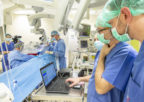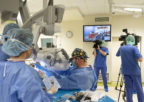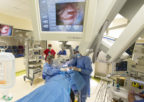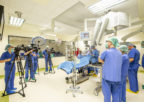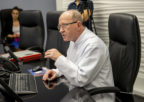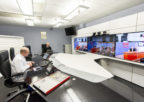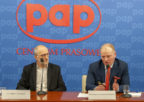At the World Hearing Center of the Institute of Physiology and Pathology of Hearing (IFPS) in Kajetany Professor Henryk Skarżyński will implant the HiRes Ultra 3D Cochlear Implant made in Hassle Free MRI technology. This implant is specially dedicated to seniors. It allows the patients to go under the magnetic resonance imagining in a field with 3 T induction, which is the basis of modern imaging diagnostics. The operation will be broadcasted live during a press conference organized at the Polish Press Agency on December 18th at 2 PM
The aging of human body is an inevitable, irreversible and constantly advancing. It applies to the whole body, with no exception. The hearing organs are also subject to this process which results in various types of hearing problems. In senior age hearing problems are common – 75 percent of people at the age over 70 have different degrees of hearing loss which affects their everyday communication. Hearing disorders are a serious social problem, which is also related to shame, reluctance or impossibility to wear hearing aids. Therefore the treatment of seniors is a challenge for science and medicine.
Today, the modern surgical and technological methods can help almost every patient with hearing loss, no matter what is the reason of that – damage the outer, middle or inner ear.
In order to maintain the dexterity and independence of people in the senior age, the ability to communicate is extremely important – it greatly depends on the quality of hearing. Hearing disorders in the elderly – besides impairments of cognitive process – are one of the two most important factors which influence the ability to communicate and can lead to social exclusion in extreme cases.
– Seniors is a group of patients for whom the new features of this generation of implants are particularly important. Each patient with an implant may find himself in a situation where, for example, due to suspected cancer, injuries or because of more frequent vascular changes within the head, the magnetic resonance imaging will be particularly necessary – says prof. Henryk Skarżyński – HiRes Ultra 3D type implant consists of four rotating cylindrical magnets surrounded by a rotating disc, which enables them to work in harmony with the magnetic field used during magnetic resonance MRI examination in all three dimensions. With the new type of implant, this examination will be possible without prior surgery of removing a part of implant so that MRI could be performed. Excluding this step will save patients both suffering and additional stress. In addition, it will reduce the cost of treatment associated with removing the magnet mechanically during the operation – emphasizes prof. Skarżyński.
Mrs. Małgorzata and Mr. Kazimierz will be the first patients in Poland, to whom prof. Skarżyński will implant the HiRes Ultra 3D. Małgorzata lost her hearing over 3.5 years ago. She recalls it happened suddenly, just like someone turned the light off.
– It causes me a lot of trouble in everyday life – said Małgorzata before the surgery – I cannot hear what a passenger tells me when I’m driving a car, I cannot also hear the car itself or phone calling. I am in a very uncomfortable situation every day because I have to ask many times what people say. After the surgery, I would like to hear everything again” she adds with a smile.
Mr. Kazimierz has great hopes regarding the procedure as well. His hearing has been gradually deteriorating for 10 years.
– Hearing loss has been disturbing me in my family life. I am annoying to my closest ones because of my frequent questions or listening to the radio too loudly – Kazimierz said before the operation – I cannot participate cultural life while I often used to go to the theater performances before. The biggest problem for me is that I cannot be professionally active at the Association of Polish Engineers and Mechanics. I believe that after the operation I will be able to fully return to my professional duties, to participate meetings, conferences and sessions of the Association’s board. – adds Kazimierz.
Any new solution like that in a field of otosurgery is very important if we consider that the percentage of people with partial deafness is growing in aging population. That means that the number of implant users will also increase. Already now the Institute of Physiology and Pathology of Hearing supervises over 8,000 people with various types of deafness who have a cochlear implants – that includes the biggest group of people with hearing disorder operated at one hospital.
The partial deafness treatment program began at the Institute of Physiology and Pathology of Hearing in 2002. Then it was prof. Henryk Skarżyński performed the first in the world surgical implantation of a cochlear implant in a patient with partial deafness. Before the operation, she understood about 10 – 11 percent of sounds. The implant restored her speech understanding in 100 percent. In 2004, prof. Skarżyński, for the first time in the world, performed the same operation in a child with partial deafness. These treatments were a breakthrough in otosurgery. Their results proved that implant placement eliminates hearing loss in the range of high or high and medium frequencies while maintaining the possibility of natural hearing in the low frequency range. The electrical complement of our own hearing or electrical-natural hearing is today our brand in modern medicine – says prof. Henryk Skarżyński.
Today the Institute of Physiology and Pathology of Hearing is the largest otolaringological center in Poland – it has been performing the world’s largest number of surgical procedures improving hearing for 15 years. The World Center of Hearing opened under the Institute’s umbrella is already a global brand itself, a showcase in this area. Polish patients have access to the latest technologies as the first in the country or one of the first in the world. In addition, the Institute has created and launched the world’s first National Teleaudiology Network enabling tele-consultations with patients and specialists from several centers at the same time, remote rehabilitation and telefitting, or remote parameter setting in speech processors in patients with various auditory implants.
The specialists from Institute conduct about 200,000 medical consultations annually and perform about 18-20 procedures. All research and scientific projects conducted at the Institute are aimed primarily at improving the life and health of society.
For over 20 years of IFPS operation its employees have managed to gain the reputation of specialists in the field of otolaryngology – the Institute’s research is being used by other medical institutions both in Poland and abroad. As part of a special cycle of international Window Approach Workshop (WAW) trainings – 38 editions Cochlear Academy and Otosurgery Academy, specialists from all over the world come to the Institute for demonstration operations and training. In total, over 4,000 specialists, officers and professors from all continents watched over 1,000 operations in Kajetany directly. Shown in the network during LION (Live International Otolaryngology Network) since 2008 operations carried out – live – by prof. Henryk Skarżyński and broadcasted around the world were watched by tens of thousands of people, and their recordings are available for trainees.
The possibilities of telemedicine show that various diagnostic tests can be successfully performed. Because of telemedicine specialists from the Institute carry out pioneer screening programs for early detection of hearing impairments in four continents of the Globe.






